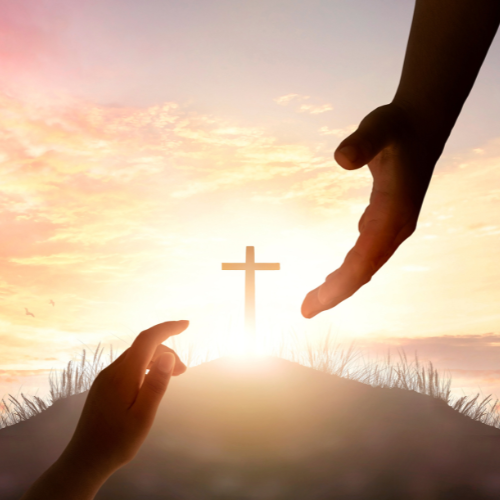Reign of Christ
- Gethsemane Lutheran Church
- Nov 23, 2025
- 5 min read

Today is Reign of Christ Sunday, also known as Christ the King Sunday. Calling this Sunday “Reign of Christ” makes a little more sense in our context because in this country, with the form of government we have (or aspire to have) we don’t talk about kings that much (unless we’re saying we want no kings as our official rulers).
One weakness in having a king as the head of a government is that sometimes kings think they don’t have to answer to anybody. That’s a problem when they’re oppressing their people because God notices what happens with vulnerable folks. And sometimes prophets show up to remind their king that indeed, the king will answer to God for whatever they’ve done. This is the job of the prophet Jeremiah, and I want to read some excerpts from Jeremiah’s message to the king:
“Hear the word of the Lord, O king of Judah sitting on the throne of David—you, and your servants, and your people who enter these gates. Thus says the Lord: Act with justice and righteousness and deliver from the hand of the oppressor anyone who has been robbed. And do no wrong or violence to the alien, the orphan, and the widow, or shed innocent blood in this place.”[1]
And, skipping ahead a few verses in this book of Scripture, I thought it was interesting that Jeremiah reports God’s thoughts about real estate, saying:
“Woe to him who builds his house by unrighteousness
and his upper rooms by injustice,
who makes his neighbors work for nothing
and does not give them their wages,
who says, “I will build myself a spacious house
with large upper rooms,”
and who cuts out windows for it,
paneling it with cedar
and painting it with vermilion.
Are you a king
because you compete in cedar?”[2]
Apparently God notices what humans build and with what materials and even the expensive paint on all the trim. These are the things Jeremiah said in the chapter before the part we just read today, where he’s saying “Woe to the shepherds who destroy and scatter the sheep of MY pasture, says the Lord…YOU have not attended to THEM. So I will attend to YOU for your evil doings, says the Lord.”
Even a king must answer to God. We call Jesus our king in defiance of earthly rulers who are mortal, but also we call Jesus our king because of the way he uses his power not to benefit himself or his family or his most generous donors. Jesus uses his power to demonstrate God’s power to heal through vulnerability, through weakness. That’s why we’re reading the crucifixion story today, the ultimate example of weakness.
This week in Bible study, someone asked why we read the crucifixion story and not the resurrection story—isn’t Easter about God’s power over sin and death? And why wallow in the sad stuff without mentioning the happy part about new life?
I think we read the crucifixion story because it is a statement of faith to say that God is present with people who are suffering and God suffers right alongside humans. It’s not that hard to rejoice with those who rejoice; it’s much more difficult to suffer alongside those who suffer. Think about your own life: when did you truly need someone with you? Was it when things were going great? Or was it when you experienced suffering of some kind?
God doesn’t say to people who are suffering: just hold on until a better future comes along. Neither does God look at suffering people and say, ew, I’m not going there, or I’ll stop by when things calm down. God enters into human life in Jesus Christ, who feels pain and loneliness and abandonment the same way we do. When Jesus is unjustly executed publicly, hanging on a cross, he tells the condemned person next to him, “Today you will be with me in Paradise,” which is to say: I’m here with you now, AND there’s more beyond this current reality and this life.
This is how God shepherds the people with care and tenderness, not just shouting at the sheep to get their act together. Jesus isn’t the kind of leader who’s telling people, you go ahead and give up your life to keep me safe on my throne. Instead Jesus leads the way into death, that very most human of experiences. Jesus will not send his followers into someplace he won’t go.
If we’re willing to look at Jesus on the cross and still conclude that war is okay and suffering is acceptable and death is no problem, well, then we’re handing away our humanity. God uses power in vulnerability, in sacrifice, in relationship, putting more value on human life rather than valuing the accumulation of wealth or valuing sufficient military might to crush many people or valuing the vermilion trim on a house that will never withstand the ravages of time.
You’d think that people who follow Jesus would also value human life, but history reminds us that Christians have gotten it wrong more than once: the Crusades, the theft of lands and peoples of the Americas, the enslavement of Africans, in our day also the persecution of transgender individuals…these are all reasons to collectively lament and seek God’s forgiveness. That should be something that Christians hold in common: the recognition that we need God’s mercy and forgiveness because left to our own choices, we will definitely mess things up.
This Reign of Christ Sunday was created in the liturgical year as a way for Christians to unify, to confess that the power of Jesus is stronger than whatever would separate us. This Sunday was created in 1925—so this year is the 100th anniversary—by Pope Pius XI (the eleventh), the leader of the Roman Catholic Church, who had witnessed the first world war and its destruction and wanted a way to assert the universal power of Jesus Christ in the face of nationalism and secularism. He originally set the date for the end of October, which you might recall, is when Lutherans are commemorating the Reformation…it took fifty years and Vatican II (when the Roman Catholic Church changed a bunch of things) before Pope Paul VI (the sixth) moved the festival to the last Sunday of the liturgical year, which falls in late November instead.
So this Reign of Christ Sunday could be a celebration of Christian unity. Or it could be a way to center ourselves within the sacrificial love of God in Jesus Christ, remembering that our identity is children of God before we are citizens of any particular country or defenders of any other political ideology. We belong to the same God who calls out kings who abuse their power, the God who aligns with the weakest and most vulnerable, who promises presence through Jesus on the cross saying “you will be with me in Paradise.”
In the language of the ancient hymn from Colossians, in Christ all things hold together. It doesn’t make sense as a political strategy, and it doesn’t look like power in the ways we tend to fear and respect power. But when did wealth bring new life? When did military power bring someone back from the dead? When did an act of Congress stop the flowers from blooming? Did an executive order ever stop the sun from rising?
In Christ all things hold together by God’s grace—all things in creation, all things within ourselves, all people as different and diverse as we are created to be. May Christ hold us together in God’s grace.
Amen.
Pastor Cheryl
[1] Jeremiah 22:2-3
[2] Jeremiah 22:13-15a
.png)





Comments